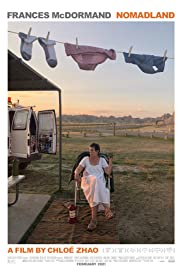 “Nomadland,” March 12, 2021 (2020), HULU. Oscar Nominated. Our Francis McDormand mini-festival continued with this new and contemplative look at an unusual American population. Fern (McDormand) loses everything when the U.S. Gypsum plant she and her late-husband worked in closed and the town, Empire, Nevada essentially disappears. She outfits a van for living and takes off, working in Amazon, working the cafeteria at Wall Drug, working the sugar-beet harvest up north. She parks with and learns from others of her ilk, a community of road warriors, houseless, she says, not homeless, i.e., nomads.
“Nomadland,” March 12, 2021 (2020), HULU. Oscar Nominated. Our Francis McDormand mini-festival continued with this new and contemplative look at an unusual American population. Fern (McDormand) loses everything when the U.S. Gypsum plant she and her late-husband worked in closed and the town, Empire, Nevada essentially disappears. She outfits a van for living and takes off, working in Amazon, working the cafeteria at Wall Drug, working the sugar-beet harvest up north. She parks with and learns from others of her ilk, a community of road warriors, houseless, she says, not homeless, i.e., nomads.
But there’s a tension there. She’s living at the margin and an expensive van repair forces her to fall back on family support. A fellow traveler Dave, the excellent David Strathairn, choses to go back to a receptive family; Fern makes the choices that fit her vision. Still others are working to save to build a house. Does all this end with Social Security? It’s plain as they say, they can’t afford to stop working at 62. Also, they are workers. And SS at 62 is, as one says, almost nothing. No one can live on that. But when work is not possible?
This is a thoughtful film, with something of a meditative feel to it, featuring only two professional actors. It has real workplaces and scenes of work. McDormand’s an astounding, intense, full-immersion actor, working at Amazon, in the sugar beet harvest, and staying in her van. It shows. Her connection to most of the other actors (almost all nomads themselves) feels genuine in a deep way. It is a thoughtful group who analyze both the abusive dependency of modern American capitalism while disdaining the ‘locked-in’ home-bound ideal.
That tension is real, even for folks on the road due to the economic crisis of 2008-onwards. The crisis is social, the answer individualized. They’re forced to decide by the crisis but are incredibly protective of the life on the road they choose. An interesting tension. There is no evident talk of collective struggle, even as mutual aid is a ubiquitous part of this life. This is a Grapes of Wrath without the organizing despite the mutual aide. Preacher Casey’s critique is still there, but the result is very different.
This is a quiet story. No one raises their voice during the entire film. They talk to one another, listen, and empathize. Certain questions go unanswered: how does someone pay for hospitalization, surgery, and medicine? They are clearly folks who chose their rural/fringe lands nomad life, not the urban homelessness of millions of others. Is there a point at which people age out of this? Can they age out? Into what?
Directed and written by Chloe Zhao and based on the non-fiction book by Christine Bruder, this chronicles a group that seems overwhelmingly white (there are some people of color in the mix). She seems to have a rather romanticized view of both American individualism and the American west. They are also portrayed as shockingly sober and drug-free, or at least those problems do not seem to dominate their lives. Real?
I’m hoping to watch Chloe Zhao’s movie “The Rider” next.